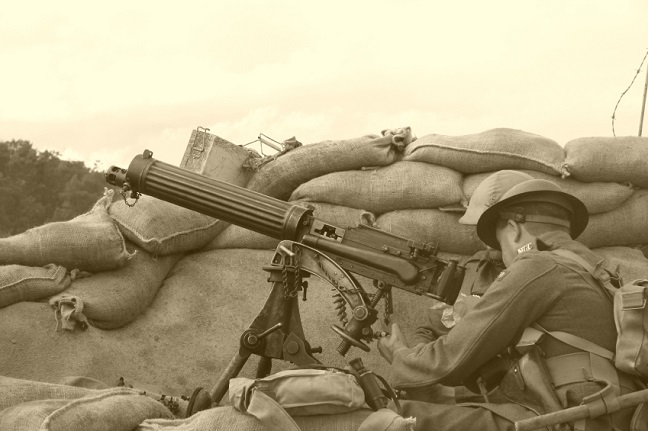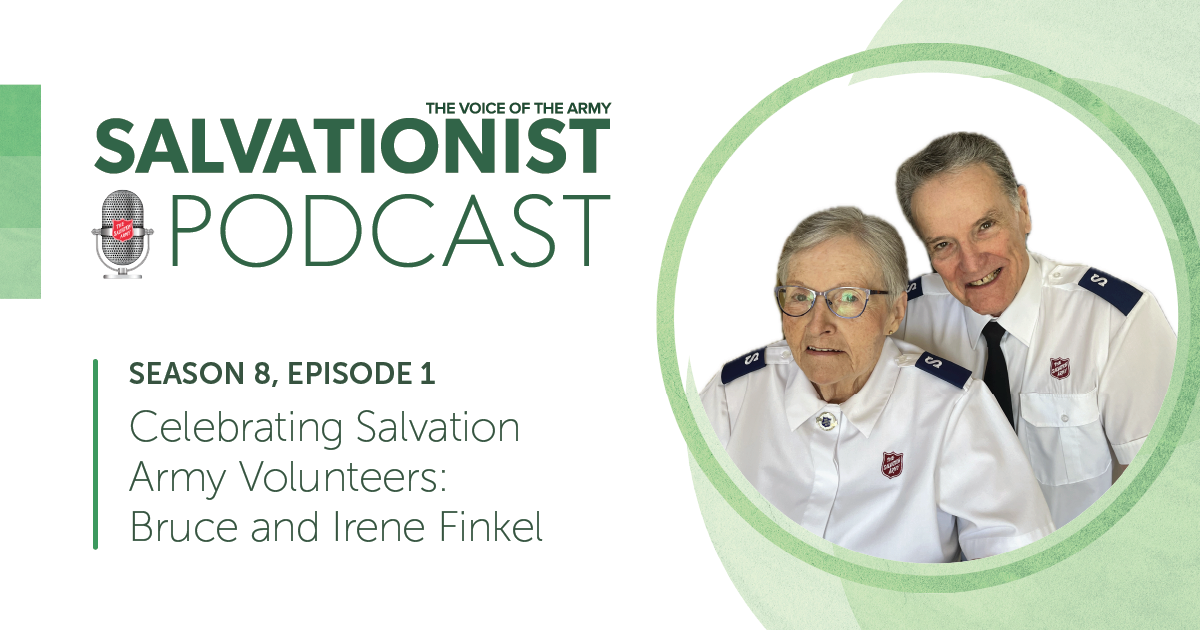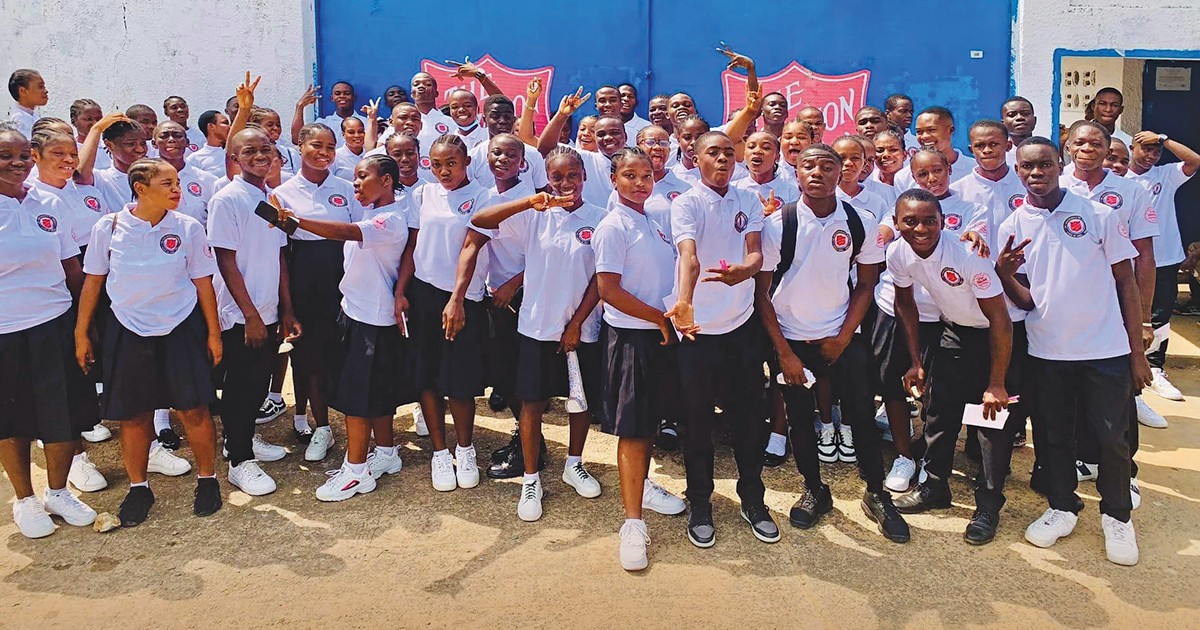In 1916, journalist Arthur Copping, with the blessing of General Bramwell Booth, then international leader of The Salvation Army, received permission to tour the Western Front, still mired in the trench warfare that had characterized the conflict since the early days of the First World War in 1914. Copping roamed the back areas and the front lines and eventually collected his observations into a book entitled Souls In Khaki. Here is an excerpt:
The Ypres Salient provided me with remarkable evidence of war's effect on the human soul, part of which I derived from the experience of an Oxford Salvationist and costermonger named James J. Dingle.
Private Jimmy saw active service at the front, where he and his comrades, with little previous experience of bullets and shelling, went straight into trenches that were being somewhat briskly bombarded.
Up to then, the general attitude towards Jimmy was one of good-humoured toleration but that began to change when they were a mile and a half from the trenches.
Then it was that they saw their first shell explode, and someone said, “Pass the word down to Jimmy to start up his old favourite hymn.” He sang three verses, and the men joined in the chorus. Then they were called to attention, and ordered to keep silent for the rest of the journey.
Morning had hardly broken when they got into trenches and lined up against the parapet.
“The shells,” said Jimmy, “were coming over dreadful.”
A man by the name of Sam said, “Wot does Jimmy think of it?”
“I think our time is come. We'd better pray,” he replied. And they did.
“O Lord,” Jimmy prayed, “we feel that our time is come. Prepare each one of us for what Thou see fit to call us to. Bless and strengthen every man in these 'ere trenches. If our time is come, may we all feel and believe that it is well with our souls. I'm praying for you all. Pray for yourselves!”
Tears ran down their cheeks. “God bless you, Jimmy!” they said.
“And God bless you, my friends!” he replied.
“O Lord,” he continued, “help us. Make us die easy if our time is come.”
“That did me good,” said Jimmy.”I 'ad felt a bit shaky, but after that I didn't mind if my time was come.”
“Jimmy, you mean business,” his friends said. “We can see what it stands for to be a Christian. It makes us not afraid of death.”
Tour of Duty
Jimmy gave other details of that critical first spell under fire. It seems that Sam was on his right—Sam, whose bad language had been conspicuous in a crowd where blasphemy was the rule. A man named Ted was on his left. At first Jimmy spoke merely to his immediate neighbours, but soon he communicated with the general body of men by the means they had adopted in communicating with him. Before praying the second time, he said, “Pass the word down that we are going to pray,” and on both sides of him the word was passed down, until the whole line were on their knees.
“We prayed,” said Jimmy, “for about a quarter of an hour. A long time but the shells were still coming over cruel.”
After they rose from their knees, Sam said, “Good old Jimmy, that's done me a lot of good. I never prayed before, but I've prayed now.”
“As for me,” Jimmy testified, “I found myself coming a lot more cheerful. After we had prayed, I was filled with joy, and was more stronger to stand the dangers. I started to sing Abide with Me and I heard one or two at it on both sides of me. They didn't know the words, but they just mummed it. After that, we had other hymns the same way, until seven o'clock came, when we got the order to stand down and sit about the trench cooking our food.”
Nobody, however, wanted any food. Jimmy and his friends merely wanted something with which to moisten their parched throats. Most of the men had already used up the pint of water with which they started from camp. But bodily needs occupied a subordinate place in their minds. They crowded round the Oxford costermonger, and encouraged him to dilate on his favourite theme.
“Then I felt,” said Jimmy, “that I needed God's guidance more than ever. They liked to hear me tell 'em about Jesus, and they said they could see there must be something in religion after all. I says to myself, 'Jimmy,' I says, 'this is your golden opportunity.' What if I 'adn't been converted? What would 'ave become of me—and them? 'What a blessing,' I says to myself, 'I'm a Salvationist and got a clean 'eart.' And every time I said anything, they said, 'Go on, Jimmy—God bless you!' There was no more swearing. The men were very quiet; they seemed different altogether. I started once more to sing Abide With Me and two or three men said they wanted to live good.”
During the day a water supply was found, and the men went to replenish their supplies. The shrapnel was still bursting, and occasionally a wounded man was borne along the trench. Jimmy was always the centre of a cluster of men listening gratefully to what he had to say.
After dark they once more stood along the trench, each man under orders periodically to stand erect, aim, fire, and then duck down again. But the edge of that new peril was blunted through a happy inspiration that came to Jimmy. Following his example, and at his suggestion, they began their spell of fighting with a few minutes of kneeling at prayer; as was destined to become their regular custom when going on duty.
“The shells were still coming over something awful,” says Jimmy. “But you wouldn't believe how different the men were. You should have seen the smiles on their faces—nothing but smiling and smiling. It was just like being in heaven.”
I asked Jimmy, who has a fine memory, to repeat some of the things he said to his comrades during those first days under fire.
“I told 'em,” replied Jimmy, “what Christ had done for me, and I said he'd do the same for them. We haven't got to go to church to get Christ, I says, we can have him here. God is waiting with outstretched arm, I says, to receive each one of us. I really felt God had made me the chaplain.”
So it went on until the unit was relieved and sent behind the lines.
Joyful Service
On returning to the trenches, Jimmy saw coloured flames advancing towards him, and his next experience was waking up in a hospital.
It was a disappointment to be pronounced medically unfit for further service in the firing line; but Jimmy recovered his musical tendencies on learning of the sphere to which the authorities proposed to appoint him.
At various parts of the war zone in France, The Salvation Army had erected huge huts in which Tommy took meals, wrote letters, listened to music and found friends anxious to help him. At one of the British bases, a hut of this character had been so greatly appreciated that the local military command, noting the efforts of the small staff of Salvationists, decided as recognition of the valuable service they were rendering the British Army to allot them an orderly from its ranks.
And it is certainly an eloquent testimony to official care in making appointments that Private James J. Dingle was appointed to the post.
So it came about that, at the time of my meeting with Jimmy, he was daily putting in 18 hours of joyful service in the hut, where he had won an incidental reputation for the excellence of the fish and chips he supplied to an unending stream of customers in khaki.
The Ypres Salient provided me with remarkable evidence of war's effect on the human soul, part of which I derived from the experience of an Oxford Salvationist and costermonger named James J. Dingle.
Private Jimmy saw active service at the front, where he and his comrades, with little previous experience of bullets and shelling, went straight into trenches that were being somewhat briskly bombarded.
Up to then, the general attitude towards Jimmy was one of good-humoured toleration but that began to change when they were a mile and a half from the trenches.
Then it was that they saw their first shell explode, and someone said, “Pass the word down to Jimmy to start up his old favourite hymn.” He sang three verses, and the men joined in the chorus. Then they were called to attention, and ordered to keep silent for the rest of the journey.
Morning had hardly broken when they got into trenches and lined up against the parapet.
“The shells,” said Jimmy, “were coming over dreadful.”
A man by the name of Sam said, “Wot does Jimmy think of it?”
“I think our time is come. We'd better pray,” he replied. And they did.
“O Lord,” Jimmy prayed, “we feel that our time is come. Prepare each one of us for what Thou see fit to call us to. Bless and strengthen every man in these 'ere trenches. If our time is come, may we all feel and believe that it is well with our souls. I'm praying for you all. Pray for yourselves!”
Tears ran down their cheeks. “God bless you, Jimmy!” they said.
“And God bless you, my friends!” he replied.
“O Lord,” he continued, “help us. Make us die easy if our time is come.”
“That did me good,” said Jimmy.”I 'ad felt a bit shaky, but after that I didn't mind if my time was come.”
“Jimmy, you mean business,” his friends said. “We can see what it stands for to be a Christian. It makes us not afraid of death.”
Tour of Duty
Jimmy gave other details of that critical first spell under fire. It seems that Sam was on his right—Sam, whose bad language had been conspicuous in a crowd where blasphemy was the rule. A man named Ted was on his left. At first Jimmy spoke merely to his immediate neighbours, but soon he communicated with the general body of men by the means they had adopted in communicating with him. Before praying the second time, he said, “Pass the word down that we are going to pray,” and on both sides of him the word was passed down, until the whole line were on their knees.
“We prayed,” said Jimmy, “for about a quarter of an hour. A long time but the shells were still coming over cruel.”
After they rose from their knees, Sam said, “Good old Jimmy, that's done me a lot of good. I never prayed before, but I've prayed now.”
“As for me,” Jimmy testified, “I found myself coming a lot more cheerful. After we had prayed, I was filled with joy, and was more stronger to stand the dangers. I started to sing Abide with Me and I heard one or two at it on both sides of me. They didn't know the words, but they just mummed it. After that, we had other hymns the same way, until seven o'clock came, when we got the order to stand down and sit about the trench cooking our food.”
Nobody, however, wanted any food. Jimmy and his friends merely wanted something with which to moisten their parched throats. Most of the men had already used up the pint of water with which they started from camp. But bodily needs occupied a subordinate place in their minds. They crowded round the Oxford costermonger, and encouraged him to dilate on his favourite theme.
“Then I felt,” said Jimmy, “that I needed God's guidance more than ever. They liked to hear me tell 'em about Jesus, and they said they could see there must be something in religion after all. I says to myself, 'Jimmy,' I says, 'this is your golden opportunity.' What if I 'adn't been converted? What would 'ave become of me—and them? 'What a blessing,' I says to myself, 'I'm a Salvationist and got a clean 'eart.' And every time I said anything, they said, 'Go on, Jimmy—God bless you!' There was no more swearing. The men were very quiet; they seemed different altogether. I started once more to sing Abide With Me and two or three men said they wanted to live good.”
During the day a water supply was found, and the men went to replenish their supplies. The shrapnel was still bursting, and occasionally a wounded man was borne along the trench. Jimmy was always the centre of a cluster of men listening gratefully to what he had to say.
After dark they once more stood along the trench, each man under orders periodically to stand erect, aim, fire, and then duck down again. But the edge of that new peril was blunted through a happy inspiration that came to Jimmy. Following his example, and at his suggestion, they began their spell of fighting with a few minutes of kneeling at prayer; as was destined to become their regular custom when going on duty.
“The shells were still coming over something awful,” says Jimmy. “But you wouldn't believe how different the men were. You should have seen the smiles on their faces—nothing but smiling and smiling. It was just like being in heaven.”
I asked Jimmy, who has a fine memory, to repeat some of the things he said to his comrades during those first days under fire.
“I told 'em,” replied Jimmy, “what Christ had done for me, and I said he'd do the same for them. We haven't got to go to church to get Christ, I says, we can have him here. God is waiting with outstretched arm, I says, to receive each one of us. I really felt God had made me the chaplain.”
So it went on until the unit was relieved and sent behind the lines.
Joyful Service
On returning to the trenches, Jimmy saw coloured flames advancing towards him, and his next experience was waking up in a hospital.
It was a disappointment to be pronounced medically unfit for further service in the firing line; but Jimmy recovered his musical tendencies on learning of the sphere to which the authorities proposed to appoint him.
At various parts of the war zone in France, The Salvation Army had erected huge huts in which Tommy took meals, wrote letters, listened to music and found friends anxious to help him. At one of the British bases, a hut of this character had been so greatly appreciated that the local military command, noting the efforts of the small staff of Salvationists, decided as recognition of the valuable service they were rendering the British Army to allot them an orderly from its ranks.
And it is certainly an eloquent testimony to official care in making appointments that Private James J. Dingle was appointed to the post.
So it came about that, at the time of my meeting with Jimmy, he was daily putting in 18 hours of joyful service in the hut, where he had won an incidental reputation for the excellence of the fish and chips he supplied to an unending stream of customers in khaki.










Leave a Comment